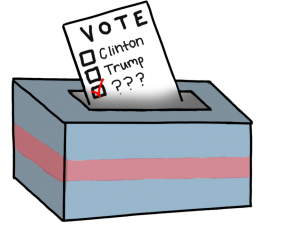This article appeared in the print magazine under the headline “None of the above”
When polling voters on their political leanings in the election, it seems appropriate to ask, “Are you a Republican or a Democrat? Trump or Clinton? Red or Blue?” Through these constant binary juxtapositions, we enforce a false dichotomy, where voters only see two potential outcomes. Although these two choices are dominating the political field, people oftentimes forget to mention the less popular option — third-party candidates.
Third-party presidential candidates, like Libertarian nominee Gary Johnson and Green Party nominee Jill Stein, among others, are more than just extra names on a ballot. Americans only focus on the two major parties, Republican and Democratic, and oftentimes are distracted from seeing what third-party candidates have to offer.
In the current race for the presidency, the country is faced with some very unpopular candidates: a Democrat who people fear is a liar and a Republican who is disrespectful towards women. According to ABC news and Washington Post Polls on Clinton and Trump’s Favorability, as of Aug. 28, 56 percent and 63 percent view Clinton and Trump, respectively, as unfavorable.
With these two major party candidates polling at historic lows, one would expect voters to welcome third-party candidates with open arms — but this is not the case.
The two third-party candidates, Johnson and Stein, are polling at a measly seven percent and two percent, respectively, according to the National Review. The reasons for why the American populace continually refuse to vote for third parties is rooted in the basic way the U.S. electoral system works.
In the U.S., the president is not chosen by the popular vote, but rather through electoral votes, which are cast by an elector. Electors are nominated by their respective political parties and are appointed during the general election. When someone votes, they are not really voting for a particular candidate directly; instead, they are voting for an elector who will (hopefully) select their candidate of choice.
Only 27 of the 50 states have laws prohibiting electors from voting for a different candidate than the one favored in their district, and even in these states the laws are very loosely enforced. Although it is very rare for electors to not go with the majority, it has happened before, most recently in the 2008 Minnesota general election where one elector chose to abstain from voting.
In turn, the electoral college impacts third party voting because even if a third-party candidate win the majority vote in a particular state, the electors can still elect not to vote for that candidate. Sin ce most, if not all, the electors are chosen by the two major parties, they tend to be fiercely loyal to the party, meaning that they won’t likely vote for a third-party candidate.
ce most, if not all, the electors are chosen by the two major parties, they tend to be fiercely loyal to the party, meaning that they won’t likely vote for a third-party candidate.
The way the votes are cast in the first place is flawed. 48 states out of 50 use the winner-take-all method of counting the electoral votes. This means that the candidate who gets the majority of vote in a particular state gets all the electors of that state. A Democrat or Republican candidate, for example in California, could get 51% of the votes but still get all the 53 electors California has. This makes it extremely difficult for a third- party candidate to get any electoral votes, since they would have to get a majority in specific states to get any electoral votes.
These problems would be minimized if there weren’t a stigma behind voting for third-party candidates. Many voters believes that a vote for any third-party candidate is a vote wasted, or a vote for the opposition. A third-party candidate may represent someone’s views better, but the perception that this is a two-horse political race convinces Americans other parties have no chance at winning. This leads to people not voting for who they agree with more, but for the candidate that they deem to be the best of their “only” two options.
A potential way to fix this and give the two major parties something to worry about is to adjust the political campaigning process, whether that entails altering the electoral system or giving third-party candidates more media attention. Third-party involvement can be an important motivator of keeping the government in check, especially when voters are not content with the status quo. Voting third party can allow people to express their discontent and resolve gridlock in controversial issues like the appointment of a new Supreme Court justice or determining the future of the Affordable Care Act. Third parties can get involved in politics in more ways than just nominated candidates, but with this anti-third party stigma in place, the chances of a third party American president are slim to none.









